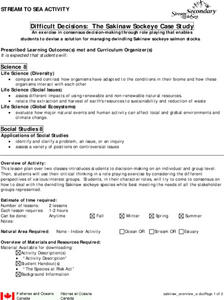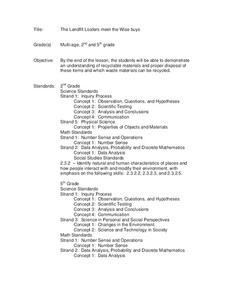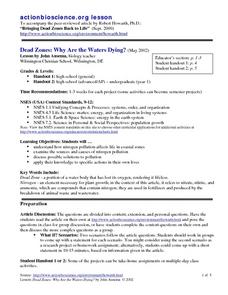Curated OER
Difficult Decisions: The Sakinaw Sockeye Case Study
Eighth graders examine Sakinaw Sockeye as species at risk, participate in role playing exercise to consider different perspectives of various interest groups, and try to come to consensus on how to deal with dwindling Sakinaw sockeye...
Curated OER
Investigating the Uses of Backyard Bacteria
Students discover that the answers to some of society's waste and clean-up problems may be no further than the soil beneath their feet. They perform a Gram stain on the colonies to determine some of their characteristics.
Curated OER
Trash...it really piles up!
Students investigate a contemporary "midden" by analyzing trash collected from various sources and determining life-style choices people make. They see that reducing the amount of waste we generate is helpful to the the environment.
Curated OER
A Community Decision!
Students investigate waste management through a simulated role-playing activity. They use a decision chart to organize their presentatioins and justify their decisions.
Curated OER
Wat-er We Good For?
Fifth graders investigate the use of water as a resource that needs to be conserved. They practice the skill of water conservation by taking a home survey of water usage and modify the use in order to decrease the wasting of water.
Curated OER
Should We Allow New Mining in the Upper Peninsula?
Students compose an essay taking a position on whether or not a proposed
mine near Marquette, MI should be opened. Students defend their position addressing relevant issues through factual supporting details. Their essay includes an...
University of Southern California
Mastering Microbes
Small but mighty! Learners explore the role of microbes in a healthy ecosystem. An engaging lesson asks pupils to design an aquaponics system that demonstrates that healthy microbes are necessary to maintain the ecosystem.
Outdoor Learning Center
Outdoor Survival
Which of the following can you survive without for the longest time: water, food, or a positive mental attitude? The answer may surprise you. Guide learners of all ages through games, activities, and discussions about surviving in the...
Curated OER
The Landfill Loafers Meet the Wise Buys
Students discover recyclable materials and the proper disposal of those items through Internet research. Working in groups of four, they search the Internet for uses of recyclable materials. After research is complete, they participate...
Library of Congress
The Conservation Movement at a Crossroads: The Hetch Hetchy Controversy
Should wilderness areas be preserved or managed? Class members examine primary source documents, including lecture notes, articles, essays and congressional records to better understand the Hetch Hetchy controversy that created a split...
Curated OER
Scams and Schemes
It's easy to spot a scheming character out on the street, but spotting scams in the financial world takes some know how. Youngsters learn about common scams and schemes that plague the financial world. After scams, schemes, and fraud are...
CFR Washington
Urbanization and Wildlife
Urbanization and how it affects wildlife is the focus of a presentation that uses statistics to make a case for concern and change.
Chicago Botanic Garden
Faces of Climate Change
Sometimes, the best solution to a problem can be found by walking in someone else's shoes. Here, scholars use character cards to take on the roles of people around the world. They determine how their character's life affects our...
Chicago Botanic Garden
Faces of Climate Change
You know global warming is real when your squirrel feeder is full of popped corn instead of kernels! Activity two in a series of five allows learners to explore climate change through the eyes of another. After briefly analyzing their...
Curated OER
Dead Zones: Why Are the Waters Dying?
Students investigate the effects of pollution on marine ecosystems. They read and discuss an article, identify the effects of pollution on marine life, conduct research on local nutrient pollution, and conduct local water quality studies.
Calvin Crest Outdoor School
Survival
Equip young campers with important survival knowledge with a set of engaging lessons. Teammates work together to complete three outdoor activities, which include building a shelter, starting a campfire, and finding directions in the...
Chicago Botanic Garden
Are You Bigfoot?
Scholars independently explore several websites to calculate their ecological footprint. Using their new found knowledge, they answer six short-answer questions and take part in a grand conversation with their peers about how our...
Chicago Botanic Garden
Introducing Ecosystem Services
Purifying air and water, providing soil in which to grow crops, and moving water through its natural cycle are all services an ecosystem provides that benefit humans. Lesson four in a series lets learners explore and discuss the value of...
Chicago Botanic Garden
Personal Choices and the Planet
The last activity in the series of four has individuals determine steps they can take to reduce their carbon footprints and then analyze their schools' recycling programs. Through a sustainability audit, they identify how and where their...
Chicago Botanic Garden
Calculating Your Carbon Footprint
Unplugging from technology for one day per week will decrease your carbon footprint—are you up to the challenge? Part two in a series of three allows individuals to explore their personal carbon footprints. By first taking a quiz at home...
Chicago Botanic Garden
Personal Choices and the Planet
How big is your footprint? Activity three culminates the series by having groups complete carbon footprint audits with people in their schools and/or around the districts. Groups then gather their data, create a presentation including...
Chicago Botanic Garden
Calculating Your Ecological Footprint
You can lower your ecological footprint by recycling! Lesson four in this series of five has individuals, through the use of a computer, calculate their ecological footprints. Through discussions and analysis they determine how many...
Chicago Botanic Garden
Introducing Ecosystem Services
Ecosystems provide many things humans not only use but also need in order to survive. The last instructional activity in the series of seven introduces scholars to the idea of ecosystem services, that ecosystems provide humans with many...
TerraCycle
What Can Nature Teach Us about Sustainable Design?
Talk about Velcro®, Gecko Tape, WhalePower turbine blades, and other innovations that mimic nature to inspire your STEM or engineering class. This set of worksheets gets them thinking about imitating nature in terms of sustainable...

























